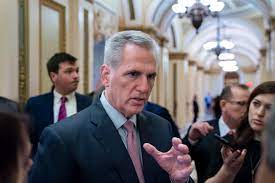Washington, May 25:A defiant House Speaker Kevin McCarthy said Wednesday the debt ceiling standoff was “not my fault” as he sent Republican negotiators to the White House to finish out talks, but warned the two sides need more time as they try to reach a budget deal with President Joe Biden.
McCarthy said he remained optimistic they could reach an agreement before a deadline as soon as next week, when the Treasury Department could run out of cash to pay its bills. Financial markets are teetering as Washington edges closer to a debt default crisis that would be unprecedented in modern times, sending shockwaves around the globe.
The White House blamed the Republicans led by McCarthy for risking a devastating default that would hit “every single part of the country” as they demand “extreme” spending cuts that would hurt millions of Americans.
“We’re not going to default,” McCarthy, R-Calif., assured.
The Republican speaker said the negotiators “made some progress” at the White House. “I want to work as hard as we can and not stop.”
Debt ceiling negotiations are locked on a classic problem that has divided and disrupted Washington before, particularly the last time Republicans used the borrowing limit as leverage to extract priorities a decade ago: Republicans want to roll back federal government spending, while Biden and other Democrats do not.
From the White House, Press Secretary Karine Jean-Pierre decried what the administration called a “manufactured crisis” set in motion by Republicans pushing “extreme proposals” that would hurt “every single part of the country, whether you’re in a red state or a blue state.”
Time is short to strike a deal. Treasury Secretary Janet Yellen said Wednesday that “it seems almost certain” that the United States would not make it past early June without defaulting. That would be catastrophic, as the government risks running out of cash to pay its bills as soon as June 1.
“We are seeing some stress already in Treasury markets,” Yellen said at a Wall Street Journal event.
Failure to raise the nation’s debt ceiling, now at $31 trillion, would risk a potentially chaotic federal default, almost certain to inflict economic turmoil at home and abroad. Anxious retirees and social service groups are among those making default contingency plans.
While Biden has ruled out, for now, invoking the 14th Amendment to raise the debt limit on his own, Democrats in the House announced they have all signed on to a legislative “discharge” process that would force a debt ceiling vote. But they need five Republicans to break with their party and tip the majority to set the plan forward.
“Sign the bill!” Democrats yelled on the House floor after the Republican Majority Leader announced lawmakers could keep plans to recess on Thursday, but could be called back for votes.
Dragging into a third week, the negotiations over raising the nation’s debt limit were never supposed to arrive at this point.
The White House insisted early on it was unwilling to barter over the need to pay the nation’s bills, demanding that Congress simply lift the ceiling as it has done many times before with no strings attached.
The newly elected speaker visited Biden at the Oval Office in February, urging the president to come to the negotiating table on a budget package that would reduce spending and the nation’s ballooning deficits in exchange for the vote to allow future debt.
Cheered on by a hard-charging conservative House majority that hoisted him to power, McCarthy was not swayed by a White House counter-offer to freeze spending instead. “A freeze is not going to work,” McCarthy said.
“We have to spend less than we spent last year. That is the starting point.”
Negotiations are focused on finding agreement on a 2024 budget year limit. Republicans have set aside their demand to roll back spending to 2022 levels, but say that next year’s government spending must be less than it is now. But the White House instead offered to freeze spending at current 2023 numbers.
By sparing defense and some veterans accounts from reductions, the Republicans would shift the bulk of spending reductions to other federal programs, an approach that breaks a tradition in Congress of budget cap parity.
Agreement on that topline spending level is vital. It would enable McCarthy to deliver spending restraints for conservatives while not being so severe that it would chase off the Democratic votes that would be needed in the divided Congress to pass any bill.
But what, if anything, Democrats would get if they agreed to deeper spending cuts than Biden’s team has proposed is uncertain.
McCarthy and his Republican negotiators said what the Democrats get is a debt ceiling increase — typically something both parties take responsibility for doing. (AP)


